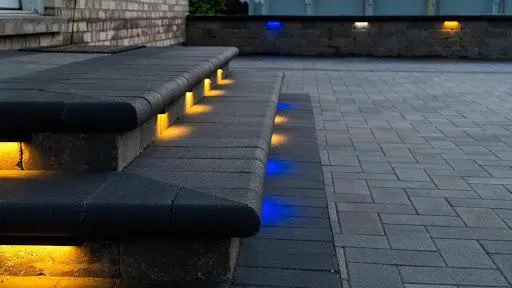Blogs

How Do I Choose The Right Outdoor Lighting For My Home?
To choose the right outdoor lighting for your home, consider factors such as the purpose of the lighting, the area to be illuminated, and the style of your home. Opt for fixtures that complement your landscape design and provide adequate illumination for safety and aesthetic appeal. Additionally, think about energy efficiency, durability, and ease of maintenance to ensure the lighting meets your needs and preferences.
Choosing the right outdoor lighting for your home involves more than just picking pretty fixtures. It's about finding the perfect balance between function and style to enhance your space's aesthetic and utility. Whether you're illuminating a walkway, creating a cozy outdoor living area, or highlighting architectural features, the right outdoor lighting can make a huge difference. With so many options available, it can be overwhelming to decide what works best for your specific needs. In this guide, we’ll explore the essential factors to consider when choosing outdoor lighting for your home.
By following these guidelines, you can ensure that your outdoor lighting not only looks great but also serves its intended purpose effectively. And for those in the Naperville area, remember that The Landscaping Experts Inc is here to help you design and install the perfect outdoor lighting solution for your needs.
Key Takeaways
Type of Fixture: Choose between decorative or functional lighting based on your needs.
Weather Exposure Rating: Ensure fixtures are rated for the weather conditions they will face.
Size and Scale: Match the fixture size to the dimensions of your space.
Style and Color: Select lighting that complements your home’s architectural style and color scheme.
Illumination Needs: Consider the brightness and type of bulbs required.
Layering and Cohesion: Use a mix of fixtures for a well-rounded lighting effect.
Mounting Height: Install fixtures at an appropriate height for optimal visibility and aesthetics.
Choosing The Best Outdoor Lighting
Type of Fixture
When selecting outdoor lighting, it's essential to determine your primary need: decorative or functional. Decorative lights enhance the aesthetic appeal of your outdoor space, while functional lights focus on practical illumination, such as for pathways or security. Knowing your main objective will guide your choice in fixture styles and features.
Decorative Lighting: Adds charm and ambiance.
Functional Lighting: Provides practical illumination for safety and usability.
Weather Exposure Rating
Outdoor lighting fixtures must be rated for their exposure to weather elements to ensure longevity and performance. Fixtures are typically categorized based on their ability to withstand moisture and other environmental conditions. Choosing the right rating is crucial for maintaining the functionality and appearance of your lighting over time.
Wet-Rated Fixtures: Suitable for direct exposure to rain and snow.
Damp-Rated Fixtures: Ideal for protected areas with indirect moisture.
Dry-Rated Fixtures: Designed for indoor use only, not suitable for outdoor areas.
Size and Scale
The size of your outdoor lighting fixtures should be proportional to the scale of your space. Properly sized fixtures will enhance the visual appeal without overwhelming or underwhelming the area. For entrance lighting, a common guideline is to select fixtures that are about one-third the height of your front door.
Small Fixtures: Suitable for smaller spaces or subtle illumination.
Large Fixtures: Best for grand entrances or expansive areas.
Style and Color
Select outdoor lighting that complements your home's architectural style and color scheme. The style of the fixture should align with your home's design, whether it's modern, traditional, or coastal. Additionally, consider the finish of the lighting fixture to ensure it contrasts well with your home's exterior for visual harmony.
Modern Styles: Sleek, minimalistic designs for contemporary homes.
Traditional Styles: Classic designs that blend with historic or classic architecture.
Coastal Styles: Light fixtures with beach-inspired designs for seaside homes.
Illumination Needs
Assess the brightness and type of bulbs required for your outdoor lighting. The amount of light needed will depend on the specific area and its use. For example, pathways may need brighter lights compared to decorative lights used for ambiance. Also, consider the glass type of the fixture, which can affect light diffusion.
High Wattage: For areas requiring bright illumination, such as security lighting.
Low Wattage: For decorative or ambient lighting purposes.
Glass Types: Clear, opaque, or seeded glass affects light diffusion.
Layering and Cohesion
Achieve a well-rounded lighting effect by incorporating a mix of fixture types. Layering different lighting styles can create depth and enhance the overall aesthetic of your outdoor space. Ensure that all fixtures work cohesively in terms of style and finish to create a harmonious look.
Ambient Lighting: Provides general illumination for large areas.
Task Lighting: Focuses on specific areas like pathways or workspaces.
Accent Lighting: Highlights architectural features or landscaping elements.
Mounting Height
The height at which you install your outdoor lighting fixtures affects both their functionality and visual appeal. Fixtures should be mounted at a height slightly above eye level but below the top of your front door. This placement maximizes visibility while maintaining a pleasing aesthetic.
Front Door Lights: Install at a height about one-third the height of the door.
Pathway Lights: Position low to the ground to illuminate the path without glare.
Essential Outdoor Lighting Tips: Design, Installation, and Maintenance
Outdoor Lighting Design Tips
Creating an effective outdoor lighting design involves more than selecting fixtures. It's about enhancing your space’s functionality and beauty. Start by assessing key areas to illuminate and use a mix of lighting types to highlight your home’s best features, while considering how it looks at various times of the day.
Evaluate Your Space: Identify areas like walkways and garden beds.
Mix Lighting Types: Use ambient, task, and accent lighting for a layered effect.
Consider Day and Night: Ensure lighting complements your space at all times.
Choose Color Temperature: Warmer tones for coziness, cooler tones for a modern feel.
The Importance of Weather-Resistant Lighting
Weather resistance is crucial for outdoor lighting due to exposure to various conditions. Knowing the ratings—wet, damp, and dry—will help you choose fixtures that endure different weather scenarios, ensuring long-term performance and appearance.
Wet-Rated Fixtures: Handle direct moisture exposure; ideal for open areas.
Damp-Rated Fixtures: Suitable for covered areas with indirect moisture.
Dry-Rated Fixtures: For indoor use only; avoid for outdoor settings.
How to Choose the Right Bulbs for Outdoor Lighting
Selecting the right bulbs impacts both brightness and ambiance. LED bulbs are favored for their efficiency and longevity. Match the bulb’s color temperature and wattage to your needs, and consider the beam angle to ensure proper light distribution.
LED Bulbs: Energy-efficient with various color temperatures.
Wattage: Higher wattage for security and pathways; lower for decorative lighting.
Beam Angle: Affects how light spreads across your space.
DIY Outdoor Lighting Installation vs. Professional Installation
Choosing between DIY and professional installation depends on project complexity and your skills. DIY can be cost-effective for simple setups, but professionals ensure precise, code-compliant installation and offer valuable design insights.
DIY Installation: Cost-effective for simple setups like solar path lights.
Professional Installation: Best for complex designs and accurate, safe installation.
Expert Advice: Professionals provide design guidance and ensure functionality.
Maintaining Your Outdoor Lighting System
Regular maintenance is essential for optimal performance and longevity. Clean fixtures, check bulbs, and inspect wiring to ensure your system remains in top condition and continues to enhance your outdoor space effectively.
Clean Fixtures: Remove dirt and grime regularly.
Check Bulbs: Replace burnt-out bulbs promptly.
Inspect Wiring: Look for wear or damage and address issues.
Adjust Positioning: Fine-tune light placement as needed for aesthetics and function.
FAQs
What type of outdoor lighting is best for a walkway?
For walkways, bright, functional lighting such as path lights or LED bollards is ideal. They provide sufficient illumination to ensure safety and highlight the path.
Can outdoor lighting be used in all weather conditions?
Not all outdoor lighting fixtures are suitable for all weather conditions. Check the rating of your fixtures: wet-rated for direct exposure, damp-rated for protected areas, and dry-rated for indoor use only.
How do I determine the right size of outdoor lighting fixtures?
A good rule of thumb is to choose fixtures that are about one-third the height of your front door if using a single light, or one-fourth the height if using two lights.
What color temperature is best for outdoor lighting?
Warmer color temperatures (2700K-3000K) create a cozy and inviting atmosphere, while cooler temperatures (4000K-5000K) provide a brighter and more modern look.
Is it better to install outdoor lighting myself or hire a professional?
For simple installations, DIY might be sufficient, but for complex setups involving multiple fixtures and wiring, hiring a professional ensures correct and safe installation.
Light Up Your Outdoor Space with The Landscaping Experts Inc
Choosing the right outdoor lighting can transform your home’s exterior, enhancing both its beauty and functionality. By considering factors like fixture type, weather ratings, size, style, and illumination needs, you can create a lighting scheme that perfectly complements your space. Whether you're looking to brighten a walkway, add ambiance to your outdoor living area, or highlight architectural features,
Call us now or fill out our online form to get started on your project. Illuminate your home with excellence and enjoy the outdoors like never before!

Follow Us
Service Areas
Plainfield
Shorewood
Morris
Lake Forest
Winnetka
Hinsdale
Western Springs
Hinsdale
Service Areas
Wilmette
Northbrook
Montgomery
Deerfield
Saint Charles
Kelinworth
Golf
Campton Hills
Barrington
Hoffman Estates
Copyright © Landscaping Experts Inc. 2025. All Rights Reserved. Privacy Policy. Terms & Conditions. Web Design by Fused Media

